The EU Open Science Forum 2 (OSF2), hosted by University of Malaya, focused on “Unlocking the Power of Knowledge, Empowering Communities.” This forum took place over two days, October 23-24, 2024, gathering scholars, policymakers, and innovators to discuss open science implementation, especially in academic institutions across Asia and Europe. From NMIMS, Dr. Jayakumar Singh Bondili Dean NMIMS School of Science, Dr. Archana Bhise Associate Dean – Research and Development NMIMS School of Engineeringand Dr. Yogesh Kulkarni Professor NMIMS School of Pharmacy participated in the forum.
Day 1 (October 23, 2024) Highlights
- Keynote Address on Open Innovation
The forum began with a keynote by Puan Hazami Habib, CEO of the Academy of Sciences Malaysia. Her speech highlighted how open innovation drives scientific advancements and the role of open science in making knowledge accessible to broader communities. She also presented the initiatives taken by various Academic Institutions to promote and implement open science policies.
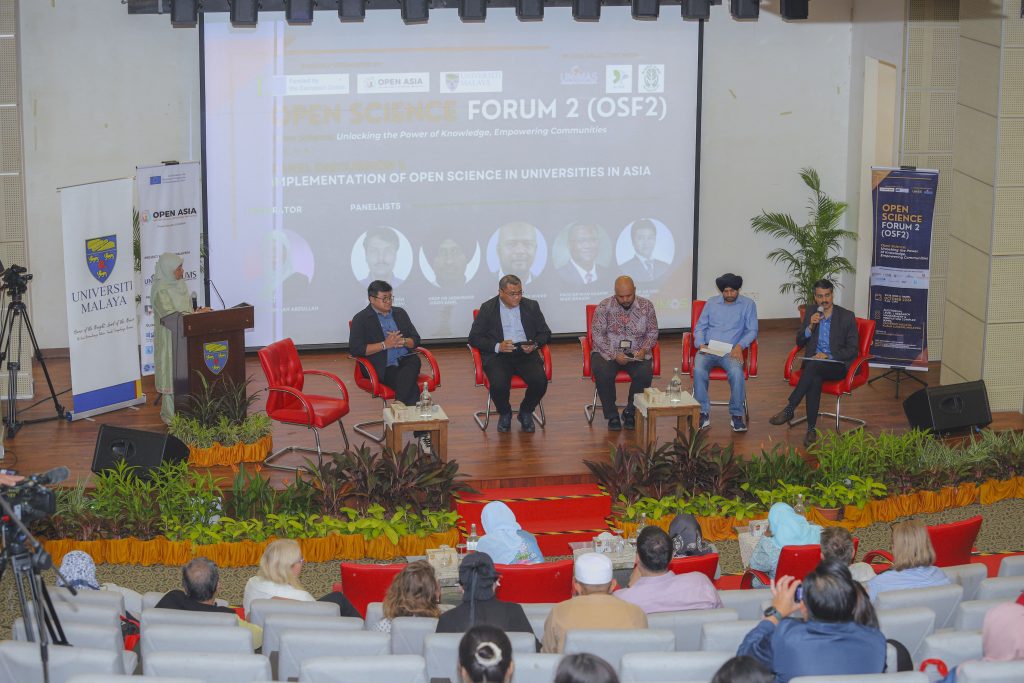
- Panel Discussion 1: Open Science in Asian Universities
Session included experts from India, Dr Yogesh Kulkarni (NMIMS, India), Dr Jaswinder Singh Saini (Thapar Institute of Engineering and Technology, India), Dr Ainuddin Wahid Abdul Wahab (Universiti Malaya, Malaysia) and Dr Ag Asri Ag Ibrahim (Universiti Malaysia Sabah, Malaysia). Experts discussed the unique challenges and successes of implementing open science in Asian institutions. The session was moderated by Dr. Abrizah Abdullah from Universiti Malaya. Panelists emphasized creating shared platforms for knowledge and data exchange and improving collaboration across borders to accelerate research output.
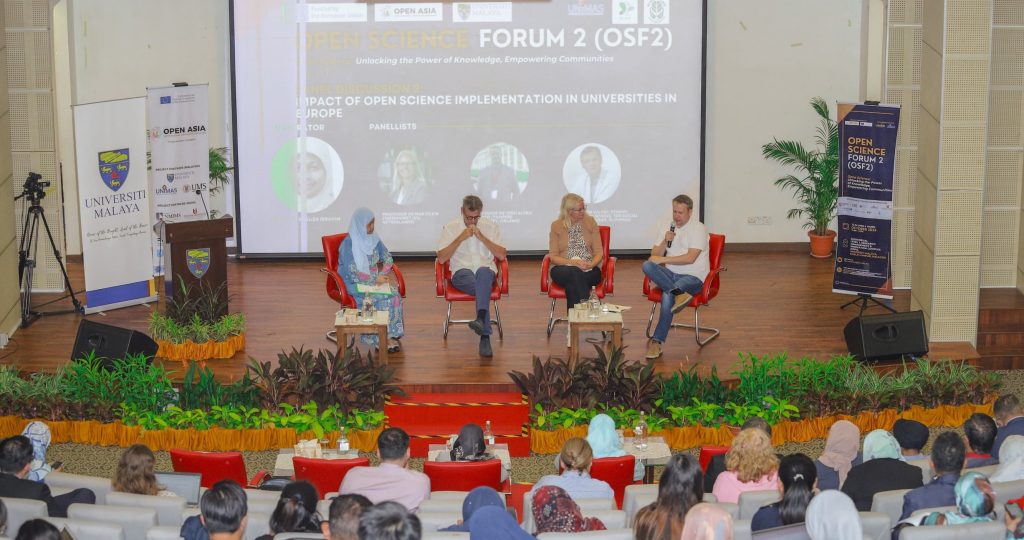
- Panel Discussion 2: Impact of Open Science in European Universities
Dr Dr. Shaliza Ibrahim moderated this session. It featured experts from the Netherlands, Finland, and Slovenia. Panelists were Dr Marjolein Zweekhorst (VU, Netherlands), Dr Jussi Aleksi Kivistö (Tampere University, Finland), Dr Valerij Dermol (International School for Social and Business Studies, Slovenia) and EPDRI, Slovenia. Discussions focused on the impact of open science policies in Europe, particularly in enhancing research transparency, data accessibility, and fostering innovation. Panelists also spoke about obstacles, such as legal restrictions and funding limitations, and shared strategies for overcoming these issues through partnerships and policy reforms.
- Session on Data Interoperability
Session was moderated by Dr. Liew Chee Sun from Universiti Malaya. The session focused on the importance of data interoperability in open science. Prof. Dr. Barend Mons (Leiden University) highlighted the need for standardized protocols and data-sharing platforms that enable seamless collaboration among researchers, promoting transparency and reuse of scientific data.
- Domain-Specific Data Sharing
The session was led by Dr. Zeeda Fatimah Mohamad. Speakers were Dr Muhd Zulfadli Hafiz Ismail (National Institute of Health, Malaysia), Dr Nurzatil Sharleeza Mat Jalaluddin (Universiti Malaya, Biodiversity), Dr Mohd Fadzil Firdzaus Mohd Nor (Universiti Malaya, Climate Research) and Dr Raha Abdul Rahim (FASc, MyGenome Initiative). This session featured domain experts discussing data-sharing practices in fields like public health, biodiversity, climate research, and genomics. Each speaker shared case studies and models for successful data sharing, demonstrating how these practices can improve research outcomes in specific scientific fields.
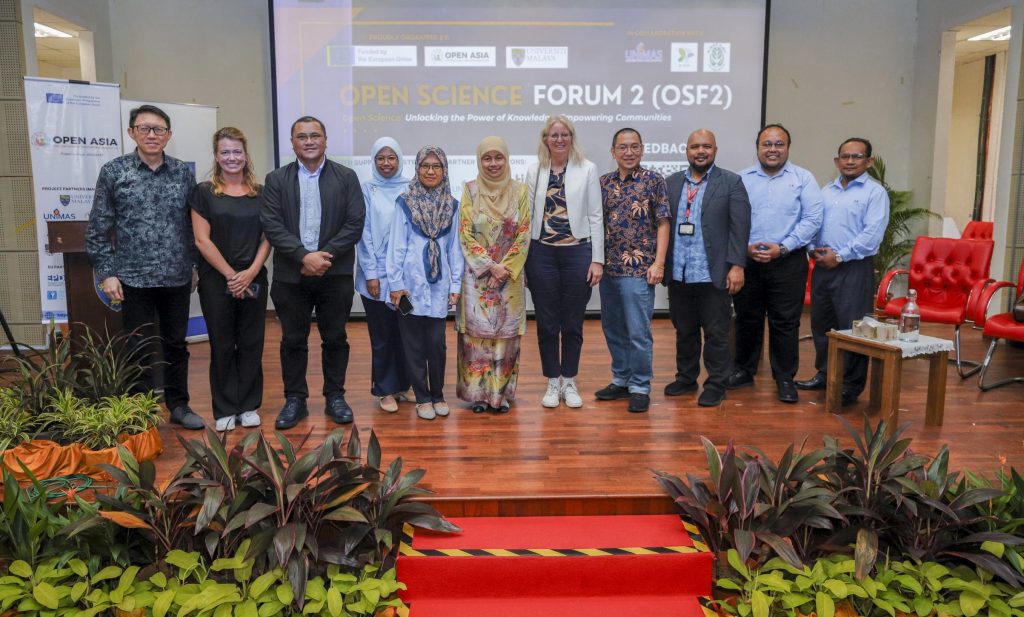
Day 2 (October 24, 2024) Highlights
- Short Performance
The second day of the meeting began on a vibrant and culturally rich note, with a display of traditional music and dance. The day commenced with an enchanting performance by a talented musician playing the Sape, a traditional lute. The Sape, with its resonant tones, created a peaceful and mesmerizing atmosphere. It reflected the indigenous history and musical heritage of Malaysia.
Following the Sape performance, a group of young women took the stage to perform a traditional Malaysian folk dance. Dressed in vibrant, culturally significant attire, the dancers brought energy and elegance, showcasing the grace and rhythmic beauty of Malaysian dance traditions.
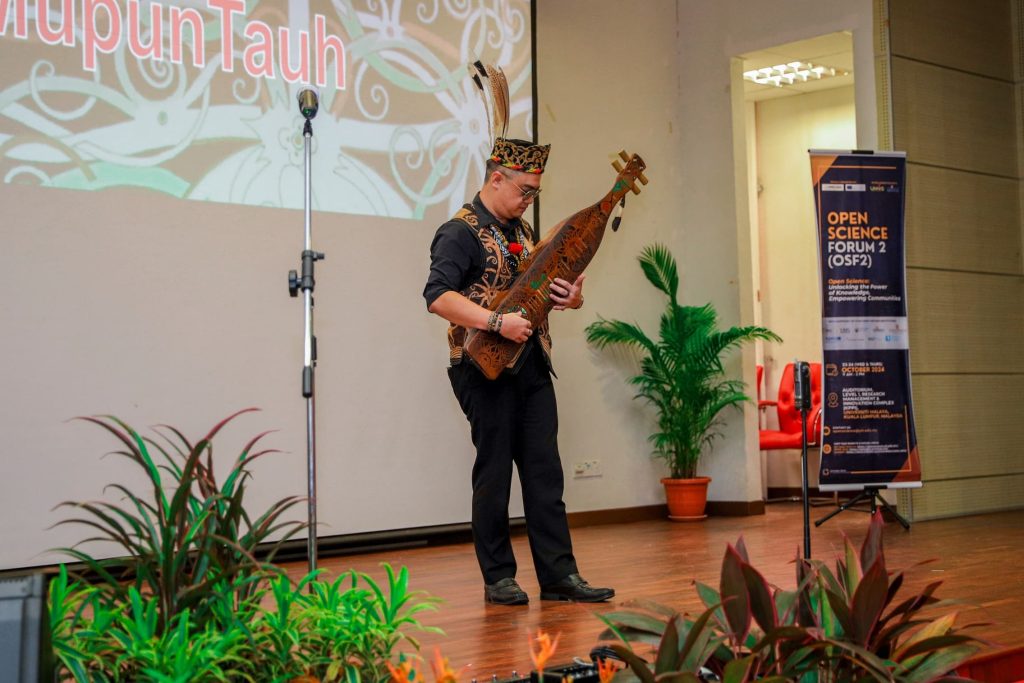
- Citizen Science and Open Dialogue
Day 2 introduced interactive workshops, starting with Citizen Science and Open Dialogue sessions. The workshops, chaired by Prof. Dr. Kiran Kaur Gurmit Singh and Prof. Dr. Rosli Ramli. Speaker were Mr Kelvin Egay John (Universiti Malaysia Sarawak), Dr Hanafi Hussin (IOES, Universiti Malaya), Dr Zeeda Fatimah Mohamad (Universiti Malaya), Mr Wan Faizah Che Din (Amanah Lestari Alam), Ms Lara Ariffin (RIMAU) and Ms Muniratul Husna Mohamad Zaki (UiTM Jengka). They explored how engaging local communities in scientific research can make science more inclusive and impactful. Participants discussed ways to bridge traditional knowledge systems with modern science, facilitating a two-way knowledge exchange that respects cultural heritage.
- Open Educational Resources (OER)
AP Dr. Nur Azah Hamzaid chaired this session. Session focused on the development and distribution of Open Educational Resources. Speakers of the session were Dr Fong Soon Fook (Universiti Malaysia Sabah) and Dr Abdullah Al-Hadi Ahmad Fuaad (Universiti Malaya). This workshop highlighted the potential of OER to democratize education, making high-quality learning materials freely accessible to students and educators worldwide.
- Emerging Topics in Open Science
The forum concluded with discussions on ‘AI for data sharing’ and ‘legal aspects of open science’. The session was chaired by Dr. Noorsaadah Abd Rahman. Dr. Aida Mustapha and Dr. Hong Xue shared insights on how AI can enhance data processing and sharing, while addressing the ethical and legal considerations of open science implementation. This session emphasized the need for regulatory frameworks that balance openness with privacy and intellectual property protections.
Key Themes and Takeaways
- Interdisciplinary Collaboration: The forum emphasized that open science requires collaboration across disciplines and sectors, from academia to policy and industry.
- Equity and Inclusion: Open science was presented as a tool to make knowledge accessible and inclusive, especially through initiatives like citizen science and OER.
- Technical and Legal Challenges: Participants acknowledged the technical barriers, such as data interoperability, and legal considerations in open science, advocating for standardized protocols and flexible policies to support international cooperation.
The OSF2 provided a platform for sharing best practices, discussing policy approaches, and developing frameworks to advance open science globally.
EU Open Sciece project institutions Vrije Universiteit Amsterdam (VU Amsterdam), Tampere University, International School for Social and Business Studies (ISSBS), European Policy Development and Research Institute (EPDRI), Thapar Institute of Engineering and Technology, NMIMS University, Universiti Malaya, Universiti Malaysia Sarawak & Universiti Malaysia Sabah participated in the two-day Forum
